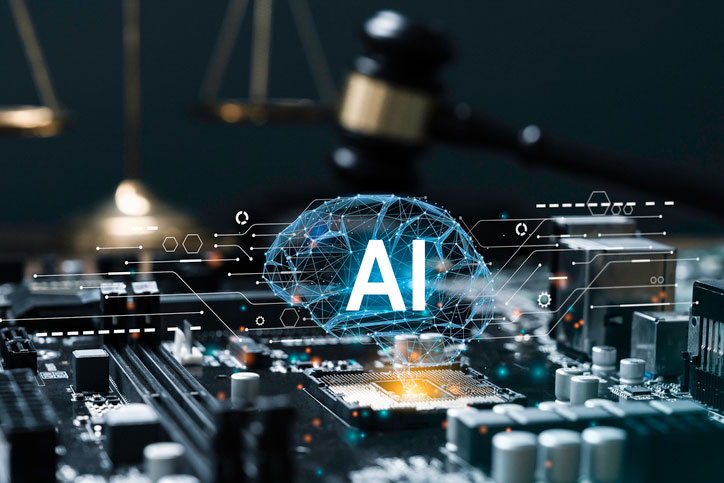Written by Rebecca Turley

For decades, South Carolina has been busy nurturing an economy that embraces technology and fosters innovation. Though the high-tech landscape is always in a state of evolution, the Palmetto State has managed to remain laser-focused on the task at hand: establish South Carolina as a leader in advanced technologies like artificial intelligence.
Today the tech sector is formidable, boasting an economic impact of $12.5 billion – or nearly 5 percent of the state’s economy, according to CompTIA’s 2023 State of the Tech Workforce. The state’s tech employment here totaled nearly 87,000 as of 2022, which represents about 4 percent of the state’s total workforce.
The push toward a tech-driven economy began back in 2003, when the South Carolina Council on Competitiveness was born. A collaborative effort between public and private organizations and business leaders, policymakers, and academia, the South Carolina Council on Competitiveness works to advance research, support industry clusters, and further education and workforce development for the state’s high-tech sector.
The council’s initiative, SC Competes, is focused on work in five key clusters, including SC Tech, which was established to accelerate growth and innovation while providing a unified voice for the statewide technology community. And efforts like SC Tech have resulted in a tech boom. According to the SC Council on Competitiveness, the number of tech companies in the state has ballooned by 254 percent between 2000 and 2020.





Today, South Carolina continues its march toward an innovation-fueled economy, and everyone from higher education to private industry to public and private R&D enterprises is joining forces to prepare for the state’s next big tech wave: artificial intelligence.
For example, in May 2023, a group of South Carolina researchers, led by Clemson University, announced the creation of a partnership aimed at modernizing healthcare diagnostics and treatment with artificial intelligence. The National Science Foundation pledged $20 million over five years for this project, entitled Artificial Intelligence-Enabled Devices for the Advancement of Personalized and Transformative Health Care in South Carolina (ADAPT-SC). This team of researchers from 11 universities will work with industry experts and SC Bio, a statewide nonprofit industry and economic development organization, to develop and advance AI-powered medical and diagnostic devices. They’ll also focus on bolstering the state’s AI-ready workforce during this time.
ADAPT-SC is just one of countless initiatives and programs aimed at revolutionizing South Carolina’s tech sector into an AI-driven powerhouse. The fact is, abundant opportunities in AI can be found throughout the state’s key sectors, from medicine to aerospace to logistics and beyond. But before you can make your mark in AI, you’ll need the education that will make you a serious contender for some of the most exciting jobs in engineering, computer science, data science, and more. Whether you’re new to the field of AI, making a career change, or rising through the ranks, an AI degree will position you for success in this interdisciplinary, swiftly growing field.
AI Unleashed: How Charleston County Is Tackling 911 Operator Shortages with Smart Solutions
 In Charleston County, artificial intelligence is solving the persistent issue of 911 worker shortages.
In Charleston County, artificial intelligence is solving the persistent issue of 911 worker shortages.
Charleston County’s Consolidated 911 Center requires about 124 people to handle its call volume, but as of April 2023, they had just 67, along with another 24 in training. With a focus on ensuring every single emergency call is answered immediately, the Center has begun using AI to handle calls routed in as administrative, defined as non-emergency calls that don’t require dispatching first responders.
Currently, administrative calls account for about one-quarter of all calls to the Center. 911 workers report taking about two minutes to handle each one of them, many of which are simply put on hold as high-priority emergency calls are routed in. Doing so results in increased call times and delays in handling emergency calls.
But non-emergency administrative calls will now be routed to Amazon Connect, a machine learning technology that is designed to provide callers with the information they need and direct them to the appropriate resources.
For example, if a caller phones in with a report of a stray dog in their yard, the ML technology will be able to ask if the animal is posing a threat to anyone. If the caller responds by saying “no,” Amazon Connect will text the person a link to the Center’s online reporting system. However, if the caller says “yes,” the call will be routed to a live 911 operator, who will be able to dispatch the appropriate first responders.
The Center hopes this new AI tool will reduce the total number of calls 911 dispatch operators handle by about 20 percent.
AI Jobs in South Carolina
According to the U.S. Department of Labor, jobs for computer information and research scientists in South Carolina are expected to grow by 14 percent in the decade leading up to 2030.
According to CompTIA’s 2023 State of the Tech Workforce, jobs for AI professionals in South Carolina rose by 4.7 percent between 2021 and 2022, or 3,853 jobs. Between 2022 and 2023, CompTIA projects that jobs here will increase again by 4.4 percent, or 3,785 jobs.
Artificial Intelligence Jobs in Spartanburg, Greenville, and Charleston
Artificial intelligence jobs in South Carolina are being ushered in at a record pace, revealing an economy where nearly all industries are embracing AI.
- Artificial intelligence analysts at Milliken and Company in Spartanburg leverage existing AI and ML solutions to address the company’s current business challenges. Their deep understanding of AI and ML models allows them to evaluate the impact on business processes.
- Data scientists (ML) at Datasoft Technologies Inc. in Greenville accelerate and support activities related to AI and computer vision as they relate to quality improvement in manufacturing.
- Senior business intelligence/artificial intelligence (BI/AI) managers in West Union lead teams of BI and AI engineers to design, develop, and implement advanced analytics and AI solutions. These professionals collaborate with cross-functional teams to understand business requirements, drive innovation, and ensure the delivery of projects.
- AI/ML software managers at Boeing in Charleston lead teams performing software engineering and technical activities related to AI/ML reusable models. They lead software and AI engineers through the full lifecycle of software development.
- AI and intelligent automation (IA) senior managers at Hubbell Incorporated in Greenville drive the adoption and integration of AI and IA initiatives throughout the organization. Their job duties include raising awareness, designing and deploying solutions, managing metrics, and supporting the entire lifecycle of these initiatives.
- AI/ML engineers at Harsco Rail in West Columbia design and develop scalable solutions using AI tools and ML models. Their primary responsibility includes addressing neural network-related challenges in the railroad and transportation sectors.
AI Companies in Charleston, Columbia, and Greenville
South Carolina’s home to a bevy of AI companies, both emerging and established, that are making waves in the state and throughout the country. Global names like Google, BASF, and Red Ventures all have a strong presence here, but so do rising AI stars like Workiva, a big name in Charleston. This company, which boasts an AI-powered cloud platform for data management and reporting, boasts 2,400 employees and 18 global offices around the world.
Sprockets is another tech leader in Charleston that’s developed an AI-powered platform that predicts candidate success before hiring. This swiftly growing startup secured no less than $10 million in Series A funding in 2022.
South Carolina has also managed to lure its fair share of tech companies who are attracted to the state’s strong startup culture and business tax incentives. For example, AI startup San Jose-based Kognitos, a leader in natural language processing, announced the opening its East Coast headquarters in the Charleston Tech Center in December 2023.
South Carolina’s research universities are home to exciting programs and initiatives aimed at discovering the next generation of AI technologies. As a result, the state continues to pump out top talent in artificial intelligence.
For example, the University of South Carolina’s Artificial Intelligence Institute (AIISC), which began in 2019, is a university-wide initiative that’s now home to more than 25 researchers. This initiative conducts interdisciplinary and translational research while also supporting workforce and economic development throughout the state.
And Clemson University’s Artificial Intelligence Research Institute for Science and Engineering (AIRISE) promotes research, education, workforce development, and industry collaboration in AI. AIRISE consists of 90 faculty members representing over 30 disciplines.
University talent and research needn’t leave South Carolina in support of outstanding support and funding. For example, South Carolina boasts its share of world-class R&D facilities, including the MUSC Innovation Center, the Applied Research Center, and the Southeastern Institute for Manufacturing Technology.
Startup support is also plentiful. Charleston is home the Charleston Digital Corridor, the Charleston Regional Development Alliance, and the Harbor… Columbia hosts the Central SC Alliance, GrowCo, and the USC/Columbia Technology Incubator… and the Greenville region is where you’ll find StartupGVL and the Upstate SC Alliance.
AI Salary in Charleston
According to the Bureau of Labor Statistics (BLS), AI scientists and engineers in South Carolina, who are categorized by the BLS as computer and information research scientists, earned a median salary of $113,440 as of May 2022. Those newest to the profession earned about $86,820 during this time, while those at the top of the pay scale earned about $138,740.
The BLS also reported that AI professionals in the Charleston metro region earned a median salary of $114,030 as of May 2022, closely reflecting the state’s median. AI scientists and engineers at the top of the pay scale in Charleston earned slightly less than the state average during this time, at 135,010.
Artificial Intelligence and Machine Learning Master’s Degree and Certificate Courses in South Carolina and Online
The demand for AI scientists and engineers in South Carolina and across the country continues at a rapid pace, and it’s clear why. Artificial intelligence has become a disruptive force in nearly every industry, transforming business and industry and reimagining how we solve problems, advance business and industry, and address today’s most pressing societal issues.
As a result, undergraduate and graduate degrees and certificate programs in artificial intelligence are growing, too. They’re producing the next generation of scientists, engineers, data analysts, business professionals, and more who have the knowledge and skills to usher in a new era of advanced technology.
AI bachelor’s degrees provide a solid foundation in the field, allowing students to explore AI as it relates to computer science and engineering. These programs feature a strong math core that includes courses like linear algebra, calculus, and probability.
AI master’s degrees and graduate certificate programs provide a more in-depth examination into AI, as well its subfields like machine learning, computer vision, deep learning, and natural language processing. Many of these programs are true interdisciplinary programs, allowing students to pick and choose courses across university departments to create a personalized program that meets their specific career goals.
2022 US Bureau of Labor Statistics salary figures for computer information and research scientists. Job growth projections from the US Department of Labor-sponsored resource, CareerOneStop. Figures are based on state data, not school-specific information. Conditions in your area may vary. Data accessed February 2024.






